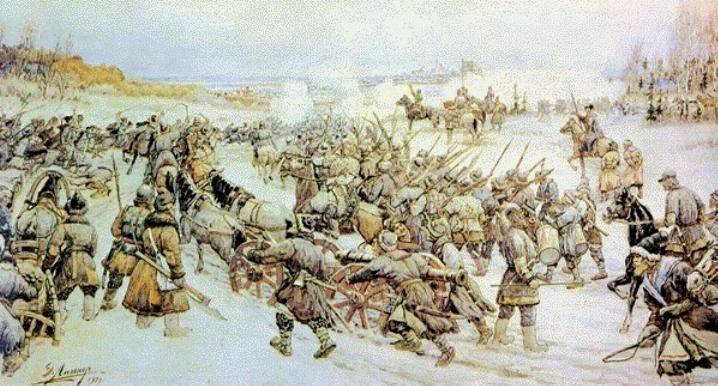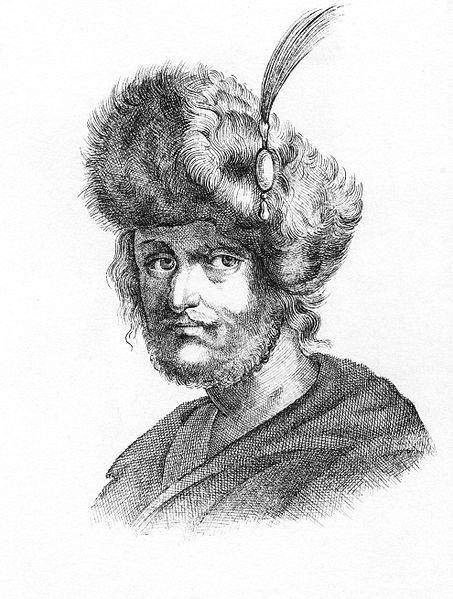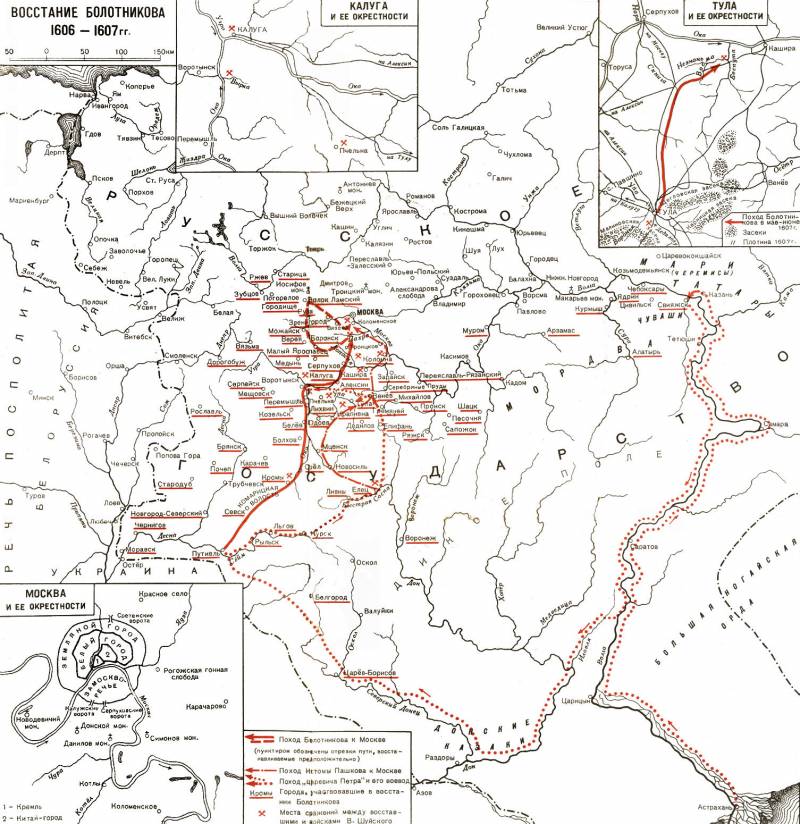How Bolotnikov besieged Moscow

Battle of Bolotnikov's army with tsarist troops near Moscow. Artist Ernest Lissner
410 years ago False Dmitry II was killed in Kaluga. A protege of Poland, an impostor who posed as if by a miracle the escaped son of Ivan IV the Terrible, Tsarevich Dmitry Uglitsky. A significant part of the Russian state submitted to his power.
"Miraculous Salvation"
Almost immediately after the impostor False Dmitry I was killed in Moscow (chopped up, burned and fired from a cannon with ashes), rumors spread throughout the city that “the tsar was alive” and would soon return. These rumors were spread by supporters of the impostor.
This caused unrest among the people. Muscovites demanded explanations from the boyars. The boyars went to Execution Ground and swore that the liar had been killed, that Otrepiev had been defrocked, and that soon everyone could see the relics of the true Tsarevich Dmitry with their own eyes. Vasily Shuisky sent in advance to Uglich for the body of the prince Philaret (Romanov), who had just been named patriarch. Also, Pyotr Sheremetev and other opponents of Shuisky entered the Uglich commission.
Tsar Vasily tried to win over Filaret, the Romanov family and his other opponents to his side. However, these favors of the new tsar in relation to the Romanov clan were in vain. Boyarin Fyodor Romanov could no longer become tsar himself, but he had a son, Mikhail. The Boyar Duma rejected the candidacy of Mikhail Romanov. However, rumors about the possibility of his election as king continued to circulate throughout the country.
Filaret played actively. In particular, he tried to overthrow Vasily Shuisky, to make room for his son. And the new impostor was a convenient figure for the fight against the Shuiskys. People from the inner circle of the murdered impostor were engaged in the "resurrection" of Dmitry. Almost all of them were of Polish origin and in custody. That is, someone from Russian nobles helped them.
In Uglich, the patriarch and the boyars discovered the relics of Tsarevich Dmitry. They were promised to be transported to the Archangel Cathedral. With a huge crowd of people, the clerks read out the accusatory articles against the impostor: before his death, False Dmitry confessed that he was a fugitive monk Grishka Otrepiev. He was accused of witchcraft, heresy, a desire to destroy the Orthodox faith. In the ruin of the treasury, etc.
However, these official statements did not achieve their goal. The belief in the "true king" proved to be tenacious, it was fueled by hatred of the boyars. Finding the relics of Tsarevich Dmitry did not help either. Martha Nagaya, obviously, at the sight of her son's body, could not utter the right words. And Shuisky's speech did not touch the crowd.
Both Shuisky and Nagaya lied and too many hypocrites to be believed. There was still anxiety among the people, which was fueled by the boyars and nobles interested in continuing the Troubles.
Soon after his election to the kingdom, Shuisky replaced the carrot with a whip. The leaders of the rebellious settlement were whipped and sent into exile. Tsar Vasily got rid of the opposition in the Boyar Duma. Many of False Dmitry's favorites were stripped of their titles and sent into disgrace, abroad. Filaret was expelled from the patriarchal court. Kazan Metropolitan Hermogenes was put in his place. He was distinguished by his cool "words" and deeds.
Hermogenes immediately launched a struggle against the "rabid" - a part of the lower clergy who were involved in the turmoil.
- reported the church author, -

Impostor. Portrait fantasy of the artist of the XIX century
A new impostor. Development of the civil war
The favorite of False Dmitry, Mikhail Molchanov, who "became famous" for the murder of Tsar Fyodor II Godunov - the son of Boris Godunov and the widow of Boris - Queen Mary, was able to escape with the help of his supporters. He was joined by Prince Grigory Shakhovsky, who was exiled to the province of Putivl.
Molchanov quickly grew bold at large and soon announced that he had helped save Tsar Dmitry. The fugitive went to Lithuania and there declared that he was the king himself, who had escaped during the May 1606 uprising. Molchanov stole the gold seal, which replaced the royal signature. Letters of letters poured into Russia from the Commonwealth
In the summer of 1606, a Polish bailiff reported to the Russian ambassadors who crossed the border:
That is, the wife of the Sandomierz voivode Yuri Mnishka, who himself at that time was in Russian captivity.
The head of the embassy, Prince Grigory Volkonsky, replied to the Pole that he was an impostor and most likely "Mikhalko Molchanov", he must have whip marks on his back (marks of torture).
Meanwhile, Grigory Shakhovsky in Putivl, seeing that the people were ready for a new riot, and wishing to reckon with Shuisky, announced that
Tsar Shuisky tried to make peace with the Putivlians, promised to consider all their complaints and give a salary higher than usual. But in vain. City Cossacks, service people, townspeople and peasants did not expect anything good from the new government. And they did not want to give up the benefits received from the impostor.
Peasants across the country were outraged by the harsh new serfdom. They did not want to put up with them. Justice, tradition and customs were on their side. The right of peasant transition has existed for centuries. The cancellation of St. George's Day violated the old law and justice. Nobody listened to pleas and requests.
A social explosion is ripe. False Dmitry promised a lot to everyone, including the peasants, but did little. The people made the appropriate conclusion: if the promised freedom was not given, it means that the dashing boyars prevented the tsar. At the same time, they also killed the king (or tried).
A new powerful wave of popular movement has risen in Russia. In the provinces, many servants, dissatisfied with their position, believed the rumors about the salvation of the king. The provincial nobility felt their strength and yearned for power and wealth.
False Dmitry himself, during his short reign, relied on servants and nobles. He summoned representatives of the nobility from the provinces to inquire about their needs, and handed out generous gifts. Now the nobles feared that with the elimination of the "son of the Terrible", the advancement course would come to an end. Therefore, the servants and nobles of the entire southern outskirts of Russia from Putivl to Tula and Ryazan rose up against Moscow.
In Putivl, the rebels were led by the nobleman Istoma Pashkov. Ryazan region was raised by Procopius Lyapunov. Pashkov and Lyapunov served False Dmitry I. Noblemen, archers, Cossacks, townspeople from different districts flocked under the banners of Pashkov and Lyapunov. In Oskol, the rebels killed Buturlin, the loyal governor of Shuisky, and Saburov in Borisov. Shein, the police officer, barely escaped from Lieven. The rebels occupied Astrakhan and some other Volga cities.
In July 1606, Moscow was under siege and preparing for battle. At first, the authorities tried to hide the truth from the people. They announced that they were waiting for the invasion of the Crimean horde. But soon the capital learned the truth. On the streets of the city, there were new apocalyptic letters from "Tsar Dmitry".
Uprising of Bolotnikov
The main point of the struggle soon became the small fortress of Yelets. False Dmitry I, preparing for the campaign against Azov, sent many guns, supplies of equipment and food to this fortress. Vasily Shuisky tried to persuade the Yelets garrison to his side, but without success. Then he sent a host led by Ivan Vorotynsky to the fortress.
Government troops laid siege to Yelets. Pashkov led the militia, which came to the aid of the besieged. The rebels themselves blocked the government forces, and then in August 1606 completely defeated Vorotynsky's army.
Meanwhile, the civil war was gaining momentum. The rebels have a new leader. It was Ivan Bolotnikov.
His origin is not exactly known: according to one version, he was one of the ruined children of the boyars, served as a military slave of Prince Telyatevsky (or was just a slave), according to the other - a Don Cossack. He had a rich biography: he was captured by the Tatar, sold into slavery, for several years he was a rower in Turkish galleys. A Christian ship captured a Turkish galley, and the slaves were freed. He lived in Venice, then through Germany he came to Poland. He served as a Cossack in the Polish Ukraine. Distinguished by bravery and military talents, he was chosen as chieftain.
He visited Molchanov in Rzecz Pospolita, the impostor gave him a letter to Prince Shakhovsky and sent him to Putivl as a personal envoy and "great voivode". By the fall of 1606, Bolotnikov arrived in Putivl with a large detachment of Zaporozhye Cossacks. Here, they enthusiastically received his news of the meeting with the "good king."
From Putivl, the rebel army marched towards the Kroms. The city was besieged by the tsarist army under the command of Mikhail Nagy and Yuri Trubetskoy. Bolotnikov tried to break through to the city. Both ratios fought hard, there was no clear winner. But the tsarist governors were not sure of their regiments.
Many nobles did not want to fight. Novgorod and Pskov nobles went home. Also, the tsarist generals were discouraged by the defeat of Vorotynsky at the walls of Yelets. Not having achieved a quick victory and fearing that the hostilities would be dragged out for the whole autumn, Nagoya and Trubetskoy took their regiments to Orel. But there was revealed the "vacillation" of the troops. The uprising in Orel led to the final disintegration of the royal army.
Meeting no resistance, Bolotnikov moved to Kaluga. Tsar Vasily sent a new army against the rebels, led by his brother Ivan Shuisky. On September 23 (October 3), 1606, the tsarist troops did not allow the rebels to cross the Ugra River. The rebels suffered heavy losses. But the tsarist governors did not use this success. Troubles spread to the Oka towns. The royal army retreated to Moscow.
Hike to Moscow
After stopping in Serpukhov, Bolotnikov led the rebel army to Moscow. A government detachment under the command of Mikhail Skopin-Shuisky stopped Bolotnikov's army on the Pakhra River, forcing the rebels to take a longer route to Moscow. This provided the capital and the tsarist governors with additional time to prepare the defense. The tsarist troops had an advantage over the rebels. Usually the well-armed cavalry of the nobility routed the rioters.
But after each failure, Bolotnikov made a new leap and approached Moscow. Having been forced to retreat from the battlefield, he did not give up, acted with tenfold energy, put in order the disorganized army, formed new detachments. On the way to Bolotnikov's army, peasants and slaves joined in crowds. On the way, the Bolotnikovites smashed the noble estates, divided the property.
In the cities, trials were held over "traitors". The alarm bells summoned the townspeople to the highest tower ("roll"). The convict was taken upstairs and after the announcement of his name and guilt they asked the people what to do with him. The people either forgave the victim or demanded execution. The culprit was thrown from the tower into the ditch.
The change in the social composition of the army, violence against the landowners, frightened the noble part of the rebel army of Bolotnikov. Pashkov's detachment acted independently. After the victory at Yelets, he could go to Tula and Moscow.
But Pashkov preferred to wage his own war. The voivode turned to Ryazhsk, then went to the Ryazan region. There Prokopiy Lyapunov gathered considerable forces. The younger Ryazan governor Sunbulov joined him. The Ryazan militia and Pashkov's detachment took Kolomna. Then Lyapunov and Pashkov decided to go to Moscow. Tsar Vasily sent his main forces against them under the command of Mstislavsky, Vorotynsky and Golitsyn. Skopin-Shuisky's detachment also hurried to them.
However, there was no unity among the tsarist governors. Mstislavsky and Golitsyn themselves dreamed of a Moscow table and did not want to fight for Shuisky. Among the nobles there were many supporters of the deceased impostor. Therefore, the army of Mstislavsky, although it had a numerical superiority over the enemy, could not withstand the attacks of the detachments of Pashkov and Lyapunov.
On the Kolomna road in the village of Troitskoye, government forces were defeated. Several thousand royal nobles and warriors were taken prisoner. They were punished with a whip and sent home.
On October 28, 1606, the advanced rebel forces occupied the village of Kolomenskoye near Moscow. Soon the main forces of Bolotnikov arrived.
The insurgent army numbered up to 20 thousand people and was constantly replenished with fugitive peasants, serfs (as a result, its number increased to 100 thousand people). However, the Bolotnikovites could not organize a full-fledged siege, and they did not want to.
The tsarist army in Moscow retained some of the communications (supply) and was constantly receiving reinforcements.
To be continued ...

Information